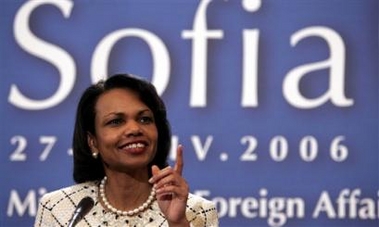Iran seems determined to defy international demands to control its disputed
nuclear program, so it is time for the U.N. Security Council to act, Secretary
of State Condoleezza Rice said Thursday.

U.S. Secretary of
State Condoleezza Rice gestures while speaking during a media conference
after a NATO foreign ministers meeting at the National Palace of Culture
in Sofia, Thursday April 27, 2006. Iran's nuclear standoff with the West
is expected to dominate talks Thursday between the U.S. and NATO
counterparts on the eve of a U.N. deadline for Tehran to halt uranium
enrichment. [AP] |
"Is the Security Council going to be credible?" Rice asked after meetings
with NATO foreign ministers.
Tehran faces a Friday deadline from the Security Council to stop enriching
uranium, a process that can lead either to nuclear power for electricity or to
development of weapons. "It's pretty clear Iran is not going to meet those
requirements," Rice said. "When that happens the international community,
represented by the Security Council, is going to have a choice."
Quick action by the council to impose economic or punitive sanctions seems
remote because of splits among its members. The United States is pressing for a
strong response and Rice wants such steps to remain an option.
The United States and European allies accuse Iran of hiding ambitions to
build a bomb behind a legitimate energy program. Iran denies it but says it must
retain control of sensitive nuclear technology, including uranium enrichment.
The United States has long sought the Security Council review now under way,
but the powerful U.N. body is divided over what to do next.
Russia and China, both veto-wielding permanent members of the Security
Council, oppose sanctions against Iran. The United States, France and Britain
say if Tehran does not meet the deadline, they will make the enrichment demand
and other conditions compulsory.
"In order to be credible the Security Council has to act," Rice told
reporters at the NATO session. "The Security Council is the primary and most
important institution for the maintenance of peace and stability and security
and it cannot have its word and its will simply ignored by a member state."
U.S. diplomats are gauging support in Europe for another course: A network of
independent sanctions and restrictions, such as a travel ban on Iranian leaders,
that might persuade the clerical leadership to back down.
Many European countries have already indicated a willingness to take such
measures on their own, such as asset seizures and potential export bans.
The U.S. already has a near total ban on economic and diplomatic contact with
Iran, but European nations and Russia maintain broad ties. Russia is a major
commercial partner of Tehran, including exporting its oil.
Earlier Thursday, Russian President Vladimir Putin said the Security Council
should not assume responsibility for the Iranian nuclear issue.
"It's still too early to run ahead and say what decision we might take
together," he said. "The main thing is ... that whatever decision is taken is a
consensus decision."
Rice was making the case for continued pressure as part of two days of
meetings with European colleagues that followed her unannounced trip to Iraq
this week. In Baghdad, Rice and Defense Secretary Donald H. Rumsfeld endorsed
newly selected Iraqi leaders who the United States hopes can regain traction
against a violent insurgency and spreading sectarian killings.
Rice tried to reassure Europeans that the United States is not planning
military action against Iran.
"I have been talking with my colleagues around the world about the diplomatic
agenda regarding Iran," Rice said. "The president of the United States doesn't
take any of his options off the table but we are committed to a diplomatic
course" that should succeed "with enough unity and with enough strength and
enough common purpose."